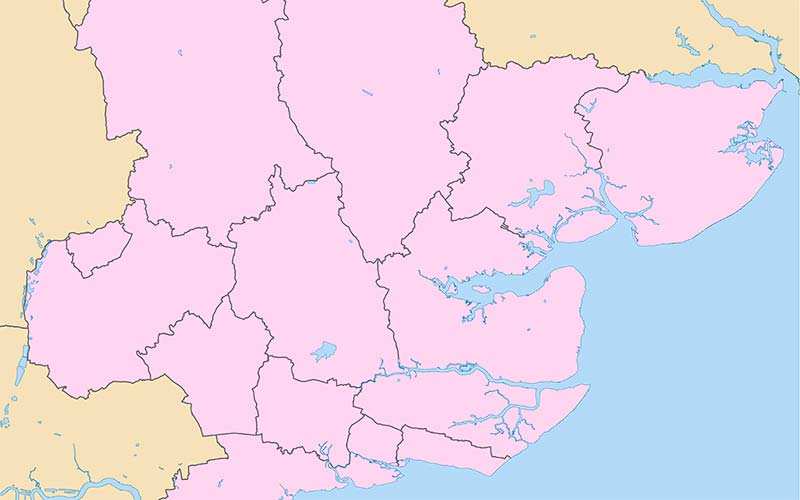
Essex County Council – ECC – has confirmed to the government that it wants to proceed with a devolution plan that would see district councils merged and this year’s county elections postponed.
If Essex – along with 11 other councils – is accepted on the Priority Programme, the plan would see the creation of ‘Greater Essex’ before the end of the decade with its own mayor and increased powers over transport and other services. Elections for a mayor are likely to take place in 2026 and elections for county councillors scheduled for May this year will be postponed, partly to avoid the expense.
Under the plans, originally developed by the previous Conservative government and carried forward by Labour, district councils in the county would be merged into three or more unitary authorities. That might mean that Tendring District Council – TDC – would merge with authorities in Colchester, Braintree and possibly Uttlesford. Along with other town and parish councils, Brightlingsea’s would remain, possibly taking over some elements that are currently managed by TDC.
After the vote at an extraordinary council meeting, ECC leader Kevin Bentley said: “This is a once-in-a-generation opportunity to improve local government, services and outcomes in Essex. Devolution and reorganisation is the best chance we have to rethink our system and bring more power into the hands of local people. It also gives us the best chance of offering decent public services at a price taxpayers can afford.”
Tendring, Colchester and Braintree councils have welcomed the proposals, saying the creation of a single strategic authority for Essex would be a “postitive step” – though much hard work would be required to see it through. A joint statement from the authorities’ leaders is reproduced below.
However, Brightlingsea independent councillor Mick Barry, who sits on the town and district councils – the latter at cabinet level – said that the plans “would cost millions of pounds with no guarantee that services will be better overall for residents.”
Responding to our request for comment, Mr Barry supplied the following personal view, which we reproduce in full below. The town’s county representative, Alan Goggin, had not responded to a similar request at the time of writing. A joint statement from
Mick Barry writes:
“The government commitment to unitarisation is clear but it does need to be critically examined by all those it will affect, councillors, staff and most importantly, residents. There are significant implications for local democracy and there is much clarification required around process, costs, timescales and outcomes. That may come in time but the decision has been made and we are all going to have to live with it.
Here I will look at some of the political implications. This is my personal view as an independent councillor and does not reflect the views of any council.
The imposition of unitary authorities in Essex will cost hundreds of millions of pounds with no guarantee that services will be better overall for residents. Residents have had no say in this decision and their opportunity to express a view through county council elections – due in May this year – have been denied by the cancellation of the elections. Current county councillors voted to extend their 4 yr term by another three years without an election, ensuring no ongoing accountability or mandate from the people they are supposed to represent.
There may well be benefits from abolishing county and district councils (about time I hear you say!) but despite many unitary authorities being created over the last 20 years or so there is no convincing evidence that they work any better than the current two tier system. Combining three districts (Colchester, Tendring and Braintree) into one will mean a large reduction in councillors covering a wider area – ensuring less local connection, communication, and knowledge. There will be less opportunity for independent representation and the main parties will dominate the seats in the new system. Overall, despite claims of devolution of power, I believe this will facilitate more control from Westminster.
Having watched the unimpressive debate which preceded the county council decision to jump in the unitary deep end, the best argument I heard for this massively complex and expensive restructuring was that ‘streamlining’ services was going to make them ‘better’, no ifs no buts! As you may gather I do not share this leap of faith, but I stand to be corrected.
One thing is sure, there will be more pressure on town and parish councils under a unitary system and they will need appropriate resourcing to cope. Greater town council powers may be one positive outcome from this exercise, we can only hope!Without much more information I remain highly sceptical about the whole process but I will work positively to achieve best outcomes for residents. I will do everything I can as a councillor at district and town level to ensure that services are protected in Tendring and Brightlingsea and made as sustainable as possible when transferred in three years time.”
Joint statement from Graham Butland (Leader of Braintree District Council), David King (Leader of Colchester City Council) and Mark Stephenson (Leader of Tendring District Council).:
“We acknowledge Southend City Council, Thurrock Council and Essex County Council’s decision to request to join the government’s Devolution Priority Programme, and recognise this is the start of a significant process that will require a great deal of collaboration and hard work across all levels of local government.
“Though we may take different personal and political views about the potential benefits and drawbacks of both Devolution and Local Government Reorganisation, we all agree that decisions are best made locally.
“We therefore collectively welcome the devolution of powers from central government, and believe the creation of a Strategic Authority for Greater Essex will be a positive step.
“If Local Government Reorganisation is to go ahead, then we believe that the sensible geography for a unitary authority would be Braintree, Colchester and Tendring, which would meet the government criteria set out in its Devolution White Paper on population size. North East Essex is a functional economic area and, crucially, we have a strong track record of successful delivery between the three councils and Essex County Council.
“This includes the shared Section One of our Local Plans, work on garden communities, as well as wider partnership work and other shared services.
“We will be committed to working constructively together on this in the months ahead to deliver the best outcome for our residents and businesses.
“This constructive work will continue despite any political or policy differences we may have, recognising our right to uphold those different viewpoints alongside any directive we may be given by our full councils – all of which will be discussing this in upcoming meetings.
We will all continue to work hard to deliver day-in day-out quality services for our communities as this transition work continues, understanding that while this process takes place our residents and businesses still need and deserve our focus, attention and support.”













